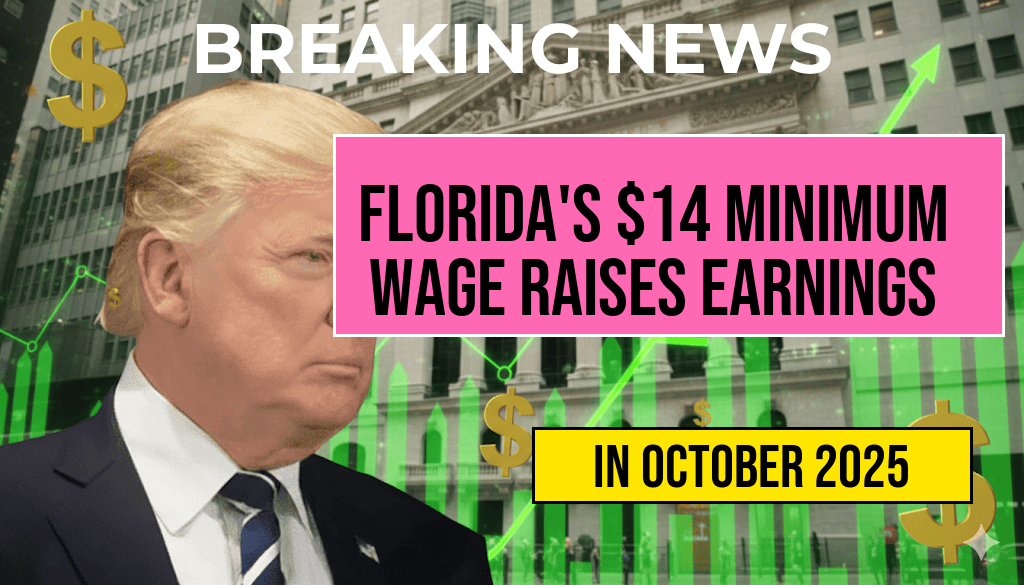Florida’s minimum wage has increased to $14 an hour as of September 30, 2023, marking a significant boost for the state’s workforce. This change, part of the scheduled annual adjustment mandated by the state’s phased minimum wage law, is expected to provide full-time workers with an additional $2,080 annually in earnings. The raise aims to help address rising living costs and reduce income disparities, impacting hundreds of thousands of employees across various industries. While advocates hail the increase as a step toward economic fairness, critics question its effects on employment and small business viability. As Florida continues to attract new residents and businesses, the minimum wage adjustment underscores ongoing debates over wage policies and economic growth in the Sunshine State.
Details of the Minimum Wage Adjustment
Legal Background and Implementation
Florida’s minimum wage law, enacted in 2004, stipulates annual increases based on the Consumer Price Index (CPI). The latest adjustment, approved by voters in 2020 through Amendment 2, raised the minimum wage from $13.75 to $14 effective September 30, 2023. The law also plans incremental increases until reaching $15 per hour by September 2026, with subsequent adjustments tied to inflation. This phased approach aims to balance fair wages with economic sustainability for employers.
Impact on Full-Time Workers
| Current Hourly Wage | Previous Annual Earnings | New Annual Earnings | Additional Annual Income |
|---|---|---|---|
| $13.75 | $28,600 | $29,120 | $520 |
| $14.00 | $29,120 | $31,200 | $2,080 |
Based on a 40-hour workweek and 52 weeks annually, full-time workers earning $14 per hour will see their yearly income increase by approximately $2,080, representing a substantial financial boost for many households.
Economic Implications and Industry Reactions
Positive Outlook from Advocates
Proponents argue that the wage increase will improve quality of life for workers, reduce reliance on public assistance, and stimulate local economies through increased consumer spending. Organizations like the Florida Retail Federation have expressed support, emphasizing that higher wages can lead to better employee retention and productivity.
Concerns from Business Groups
Conversely, some small business owners and industry groups voice concerns about rising labor costs. They warn that increased wages could lead to higher prices for goods and services, potential layoffs, or reduced hiring. A report by the Florida Chamber of Commerce highlights the challenges small employers face in adjusting to higher wage standards, especially amid ongoing economic uncertainties.
Broader Context of Wage Policy in Florida
Comparison with National Trends
Florida’s minimum wage increase aligns with a broader national pattern of states adjusting wages to reflect inflation and cost of living changes. According to data from the U.S. Bureau of Labor Statistics, several states have implemented or planned similar increases, emphasizing a shift toward living wages in various regions.
Future Wage Projections
As the phased plan progresses, Florida expects to reach a $15 minimum wage by 2026. This gradual approach aims to provide businesses time to adapt while ensuring workers benefit from ongoing increases tied to economic indicators. Experts anticipate that further adjustments will continue to influence employment patterns and regional economic health.
Additional Considerations and Ongoing Debates
Impact on Employment and Business Viability
Research on the effects of minimum wage hikes presents mixed findings. Some studies suggest modest employment reductions among low-wage workers, while others indicate minimal impact or even positive effects through increased consumer spending. Policymakers and economists remain divided, emphasizing the need for ongoing analysis and tailored strategies.
Community and Worker Perspectives
Many workers in sectors such as retail, hospitality, and healthcare have welcomed the increase, citing improved financial stability. Community organizations advocate for further measures to support low-income earners, including targeted tax credits and workforce development programs.
Sources
- Wikipedia – Minimum wage in the United States
- Forbes – How Florida’s Minimum Wage Increase Could Affect the Local Economy
- U.S. Bureau of Labor Statistics
Frequently Asked Questions
What is the new minimum wage in Florida?
The minimum wage in Florida has increased to $14 an hour, effective immediately, marking a significant boost for workers across the state.
How does the wage increase impact full-time workers’ annual earnings?
For full-time workers earning the new minimum wage, their annual earnings are expected to rise by approximately $2,080.
When did Florida implement the new minimum wage?
The state of Florida implemented the new minimum wage of $14 an hour starting from the latest applicable date, with plans for future increases.
Are there any phased increases or future wage adjustments planned?
Yes, Florida has scheduled in the minimum wage over the coming years, aiming to reach a higher standard and improve workers’ earnings.
Who benefits most from the wage increase?
The full-time workers earning the minimum wage directly benefit, gaining higher annual earnings, which can improve their financial stability and quality of life.






